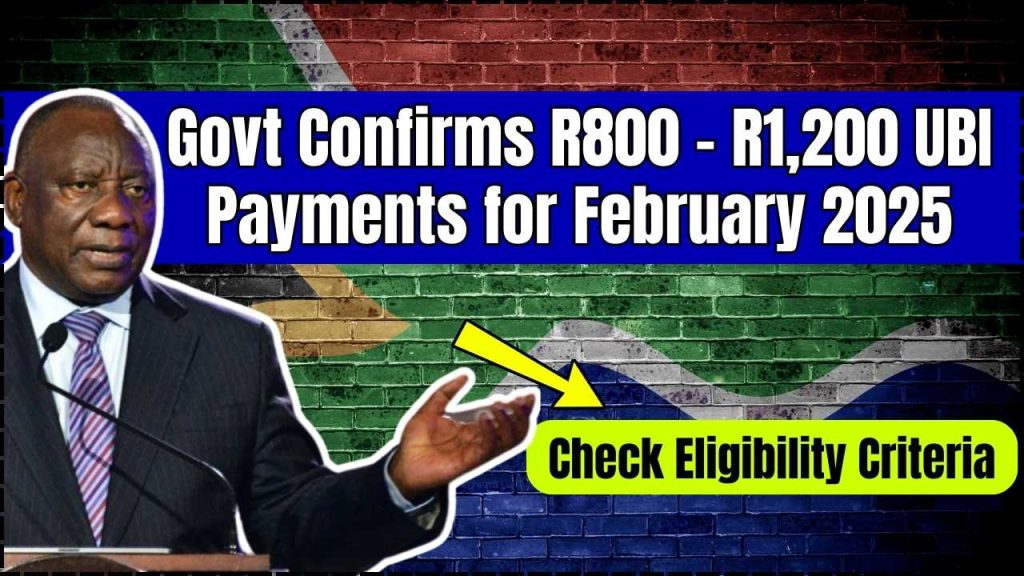UBI Payments for February 2025: In a significant move towards economic relief, the South African government has confirmed Universal Basic Income (UBI) payments ranging from R800 to R1,200 for February 2025. This initiative aims to support unemployed and low-income individuals struggling with the rising cost of living. As inflation continues to impact basic necessities, such as food, transport, and utilities, this grant provides much-needed relief to millions of South Africans.

For those wondering if they qualify, this article provides comprehensive details on eligibility criteria, application procedures, and key considerations to ensure you don’t miss out on this crucial financial aid. With an easy-to-follow application process, this grant aims to make social assistance more accessible than ever before.
UBI Payments for February 2025
| Aspect | Details |
|---|---|
| Payment Amount | R800 – R1,200 |
| Eligibility | South African citizens or permanent residents, aged 18-59, unemployed or low-income earners |
| Application Methods | Online, SASSA offices, mobile units, SMS/USSD options |
| Processing Time | 2-4 weeks |
| Official Source | SASSA |
The introduction of R800 – R1,200 UBI payments in February 2025 is a critical step in addressing financial hardship for many South Africans. If you qualify, ensure you apply through the correct channels and provide accurate information to avoid delays. Stay updated with official SASSA announcements to track application deadlines and payment schedules.
Understanding the Universal Basic Income (UBI) Grant
The UBI grant is a social relief initiative by the South African government, designed to provide a basic financial cushion to individuals struggling with joblessness and economic hardship. This effort is part of the broader strategy to address poverty and inequality in the country.
The grant is expected to benefit millions of unemployed and underemployed individuals, offering them financial stability and enabling them to cover essential living costs. The government is also exploring ways to expand the initiative if future economic conditions allow for sustainable long-term implementation.
Why is the Government Implementing UBI?
The decision to roll out UBI payments stems from several economic and social challenges:
- Rising Unemployment: South Africa’s unemployment rate remains high, with over 32% of the workforce without jobs (Stats SA, 2024).
- Inflation Pressures: Basic goods and services have become increasingly expensive, making it difficult for low-income households to afford necessities.
- Economic Recovery Post-Pandemic: The long-term economic impact of COVID-19 continues to affect many individuals and families, especially those in informal sectors.
- Increased Demand for Social Assistance: More citizens are applying for financial assistance due to the high cost of living and job scarcity.
Who is Eligible for the R800 – R1,200 UBI Payments?
To qualify for the UBI payments, you must meet the following eligibility criteria:
1. Citizenship and Residency
- You must be a South African citizen or permanent resident.
2. Age Bracket
- Eligible individuals must be between 18 and 59 years old.
3. Employment & Income Status
- The grant is specifically for unemployed individuals or those with low incomes (exact threshold to be announced by SASSA).
- If you are already receiving a government grant, such as an old-age pension or disability grant, you may not be eligible.
- Individuals engaged in informal work but earning below a government-determined threshold may qualify.
4. Bank Account & Payment Verification
- Applicants must provide a valid South African bank account for the payment to be processed.
- The government may conduct income verification checks to ensure only those in need receive assistance.
How to Apply for the UBI Payments
The government aims to make the application process as simple and accessible as possible through multiple methods.
1. Online Application
- Visit the official SASSA website.
- Navigate to the UBI Grant Section and fill out the required details.
- Upload the necessary documents (ID, proof of income, etc.).
- Submit and wait for a confirmation message.
2. In-Person Registration
- Visit your nearest SASSA office.
- Bring along your ID, proof of address, and bank details.
- A SASSA official will assist with the application process.
3. Mobile Units for Rural Areas
- Mobile registration units will be set up in remote and underserved communities to ensure accessibility.
- These units will operate on a scheduled basis, so check with local municipalities for dates.
4. SMS or USSD Application
- For those without internet access, a USSD or SMS-based application system will be introduced.
- Applicants can dial a provided USSD code, enter their details, and submit their request.
What to Expect After Applying For UBI Payments?
Once your application is submitted, the processing time may take 2–4 weeks. You will receive:
- A confirmation SMS/email once your application is received.
- A final approval notification with details of when and how payments will be made.
- Rejection notices (if any) with reasons and possible appeal options.
SASSA Payments to Increase in 2025 – Check Who’s Eligible for the Increased Amount in South Africa!
Transnet Vacancies 2025: Unlock Exciting Job Opportunities in South Africa
5 South African Coins That Could Be Hiding in Your Wallet – Worth Thousands!
FAQs About UBI Payments for February 2025
1. When will payments be made?
Payments will start rolling out in February 2025 and will follow a monthly schedule.
2. How will payments be disbursed?
Beneficiaries will receive payments via bank deposits, Postbank services, or SASSA payment points.
3. Can I apply if I already receive a social grant?
No, the UBI grant is not available for individuals already benefiting from other SASSA grants (such as disability or pension grants).
4. What if my application is rejected?
You can appeal the decision by:
- Visiting a SASSA office.
- Calling the SASSA helpline.
- Submitting an appeal online at www.sassa.gov.za.
5. Is the UBI grant permanent?
As of now, the government has confirmed UBI payments for 2025, but long-term sustainability will depend on future policy decisions and funding.










